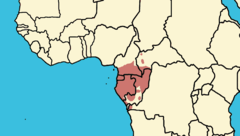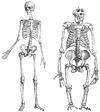- Central chimpanzee
-
Central chimpanzee[1] Conservation status Scientific classification Kingdom: Animalia Phylum: Chordata Class: Mammalia Order: Primates Family: Hominidae Genus: Pan Species: P. troglodytes Subspecies: P. t. troglodytes Trinomial name Pan troglodytes troglodytes
Blumenbach, 1775
The central chimpanzee (Pan troglodytes troglodytes) is a subspecies of the common chimpanzee (one of the closest living relatives to humans, along with the bonobo). It occurs mainly in Gabon, Cameroon, and the Republic of the Congo, but also, to a lesser extent, in other regions.
Contents
Etymology
Pan is derived from the Greek god of fields, groves, and wooded glens, Pan. Troglodytes is Greek for 'cave-dweller', and was coined by Johann Friedrich Blumenbach in his Handbuch der Naturgeschichte (Handbook of Natural History) published in 1779.
Classification
The central chimpanzee is considered a subspecies of the common chimpanzee (Pan troglodytes), along with the western chimpanzee (P. t. verus), the Nigeria-Cameroon chimpanzee (P. t. vellerosus), and the eastern chimpanzee (P. t. schweinfurthii).
Distribution and habitat
The central chimpanzee occurs in Central Africa, mainly in Gabon, Cameroon, and Republic of the Congo, but also in the Central African Republic, Equatorial Guinea, the Cabinda exclave of Angola , south-east Nigeria, and (possibly) the coastal extension of the Democratic Republic of the Congo. Its range extends north to the Sanaga River in Cameroon, east to the Ubangi River that defines the border between the two Congos, and south to the Congo River, which defines a large part of the same border.[2][3]
Chimpanzees are found predominantly in tropical moist forests and wet savanna woodlands, as well as the forest-savanna mosaics where these two biomes meet, from sea level to 3,000 metres (9,800 ft).[4] They tend to have larger ranges in the forest-savanna mosaics.[2] The average range is 12.5 km2 (4.8 sq mi), but can vary from 5 km2 (1.9 sq mi) to 400 km2 (150 sq mi).[2]
Conservation
The 2007 International Union for Conservation of Nature (IUCN) Red List of Threatened Species classifies the central chimpanzee as Endangered.[2] In 1988 they were considered "Vulnerable", but have been considered "Endangered" since at least 1996.[2] The World Wildlife Fund (WWF) estimates there are as many as 115,000 individuals alive,[1] but that the number is more likely between 47,000 and 78,000[4] The Central Chimpanzee only has large, robust populations where large amounts of forest are left undisturbed; smaller, isolated populations also remain.[3] According to the IUCN, decline in the central chimpanzee population is expected to continue for another 30 to 40 years.[2]
Major threats to central chimpanzee populations include Ebola hemorrhagic fever, poaching for bushmeat, and habitat destruction.[1][2][4] The IUCN attributes this to increasing human presence (agriculture, de-forestation, development) and political instability.[2]
Due to their close genetic relationship to humans, chimpanzees are vulnerable to viruses that afflict humans, such as Ebola, the common cold, influenza, pneumonia, whooping cough, tuberculosis, measles, yellow fever, HIV and may contract other parasitological diseases such as schistosomiasis, filariasis, giardiasis, and salmonellosis.[4]
Link with HIV-1
Two types of Human Immunodeficiency Virus (HIV) infect humans: HIV-1 and HIV-2. HIV-1 is the more virulent and easily transmitted, and is the source of the majority of HIV infections throughout the world; HIV-2 is largely confined to west Africa.[5] Both types originated in west and central Africa, jumping from primates to humans. HIV-1 has evolved from a Simian Immunodeficiency Virus (SIVcpz) found in the central chimpanzee.[6][7] Kinshasa, in the Democratic Republic of Congo, has the greatest genetic diversity of HIV-1 so far discovered, suggesting that the virus has been there longer than anywhere else. HIV-2 crossed species from a different strain of SIV, found in the Sooty Mangabey, monkeys in Guinea-Bissau.[5]
References
- ^ a b c World Wildlife Fund: Central chimpanzee. Retrieved 18 July 2008.
- ^ a b c d e f g h i Tutin, C.E.G., Baillie, J.E.M., Dupain, J., Gatti, S., Maisels, F., Stokes, E.J., Morgan, D.B. & Walsh, P.D. (2008). Pan troglodytes ssp. troglodytes. In: IUCN 2008. IUCN Red List of Threatened Species. Downloaded on 4 January 2009.
- ^ a b WWF: Central chimpanzee – Population & Distribution. Retrieved 18 July 2008.
- ^ a b c d WWF: Chimpanzee facts and issues. Retrieved 18 July 2008.
- ^ a b Reeves JD, Doms RW (June 2002). "Human immunodeficiency virus type 2". J. Gen. Virol. 83 (Pt 6): 1253–65. doi:10.1099/vir.0.18253-0. PMID 12029140. http://vir.sgmjournals.org/cgi/pmidlookup?view=long&pmid=12029140.
- ^ Keele BF, Van Heuverswyn F, Li Y, et al. (July 2006). "Chimpanzee reservoirs of pandemic and nonpandemic HIV-1". Science 313 (5786): 523–6. doi:10.1126/science.1126531. PMC 2442710. PMID 16728595. http://www.pubmedcentral.nih.gov/articlerender.fcgi?tool=pmcentrez&artid=2442710.
- ^ Gao F, Bailes E, Robertson DL, et al. (February 1999). "Origin of HIV-1 in the chimpanzee Pan troglodytes troglodytes". Nature 397 (6718): 436–41. doi:10.1038/17130. PMID 9989410.
External links
Extant species of family Hominidae (Great apes) Ponginae Homininae CategoryApe-related articles Ape species 
Ape study Ape language · Ape Trust · Dian Fossey · Birutė Galdikas · Jane Goodall · Chimpanzee genome project · Human genome project · Neanderthal genome project · Willie Smits · Lone Drøscher Nielsen · Borneo Orangutan SurvivalLegal and social status See also Bushmeat · Ape extinction · List of notable apes · List of fictional apes · Human evolution · Mythic humanoids · HominidCategories:- IUCN Red List endangered species
- Chimpanzees
Wikimedia Foundation. 2010.

